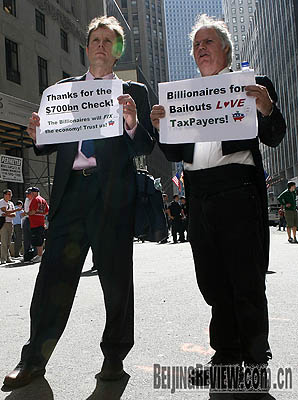 |
|
RESCUE UNDER FIRE: Two men dressed as bankers protest the U.S. Government's rescue plan on Wall Street on September 30. Critics say the government should help American homeowners facing foreclosure instead of bailing out collapsing financial giants with taxpayers' money |
Originating in the subprime mortgage crisis, the U.S. financial crisis has developed into the most severe financial disaster since the Great Depression (1929-33). It is also spreading worldwide, wreaking havoc on the real economy. Its implications for the U.S. presidential election are not to be underestimated.
Since the Great Depression brought traditional laissez-faire policy to an end, the government has been charged with regulating the economy and preventing and mitigating economic crises. As a result, presidential candidates always include economic issues in their platforms. Their evaluations of the market may affect its development, though not as directly as the incumbent president's, because market players are fully aware that their views will determine future government policy. Economic volatility also galvanizes voters.
Democratic presidential candidate Barack Obama and his Republican rival John McCain are currently vying to sell their viewpoints on crisis response and rescue to American voters. President George W. Bush does not want to end his final term as a failure either, although he has led the United States into exhausting wars in Afghanistan and Iraq and created a deep divide in the Western world. He is using the financial crisis to foster an image of a strong, effective leader. He consulted the presidential hopefuls while devising rescue policies that would win support from both political parties. For example, the White House invited Obama and McCain, as well as other influential congressmen and senators, to take part in discussions before it submitted the $700 billion rescue package to Congress for approval.
Central bank demystified
As a rule, an economic crisis prior to a presidential election puts the ruling party's candidate at a disadvantage. It is generally assumed that the party in power is responsible for the economic recession and that the candidate of that party supports its policies. To enhance the electoral chances of his party's candidate, the incumbent president usually tries to stimulate economic growth using various policy tools.
Between the two main macroeconomic policy tools-fiscal policy and monetary policy-the latter is key to curbing inflation. To prevent economic instability caused by improper governmental interference, an increasing number of countries have made their central bank independent.
Nevertheless, the independence of central banks is limited. Central bankers have to coordinate their actions with the political conditions at the time. If they run into conflicts with political leaders, they may risk undermining the central bank's independence and influence. The U.S. Federal Reserve System was not established until 1913. It became increasingly powerful as President Franklin Roosevelt introduced the New Deal in the 1930s before gaining independent status in 1951.
Although it formulates monetary policy "independently," the U.S. Federal Reserve operates under influence from the president, Congress and upcoming presidential elections. Monetary policy, the performance of the money market and interest rates all hinge on the government's budget, expenditures, tax revenue and deficits. Instead of passively accepting the current monetary policy, the government often demands that the central bank adjust monetary policy according to its own decisions. Indeed, central bankers have to rely on political leaders to make their policies work. An independent central bank is, to a large extent, an illusion created by politicians so they can easily shift the blame to central bankers when the economy slumps.
The U.S. Federal Reserve, now led by Ben Bernanke, has taken extraordinary measures to cope with the current financial crisis. It tried to mitigate the lack of liquidity and rein in the credit crunch by adjusting interest rates and providing financing. As the root cause of the U.S. financial crisis lies in the inefficient regulation of financial institutions and their collapsing balance sheets, the Treasury, which is responsible for regulating financial institutions, infusing them with new capital and purchasing non-performing credit assets, should play a bigger role.
Unlike President Herbert Hoover, who was slow to action when the Great Depression began in 1929, the Bush administration is a major rescuer this time around. In this context, what the presidential candidates can do is to convince voters that they have better ways of addressing the crisis. Their views may well change with the passage of time. In his book The Age of Turbulence: Adventures in the New World published last year, Alan Greenspan celebrated the magic of financial markets while condemning the stupidity of those who favor regulation. McCain, who held Greenspan in high esteem, said in October 2007 that as president he would appoint the former Federal Reserve chairman to lead a review of the nation's tax code. However, as Greenspan's reputation declines, McCain has transformed from a conservative touting laissez-faire policy into a supporter of regulation.
Global repercussions
Lavishly paid executives at the financial institutions that caused the crisis have been vilified by Americans and Europeans. The dominant public opinion is that Wall Street executives shouldn't receive taxpayer money to save their ailing businesses while pocketing tens or hundreds of millions of dollars in salary or bonus. This explains why U.S. congressmen and senators, including Obama, McCain and Christopher Dodd, who chairs the Senate Banking Committee, support the rescue program but at the same time call for executive salary caps.
| 